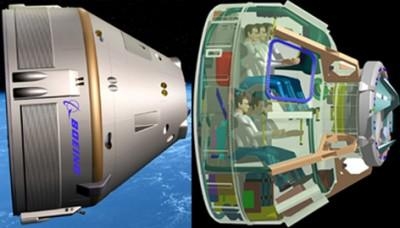Thu, Jun 28, 2012
CST-100 Attitude Control System Will Be Comprised Of Twenty-Four Of The Thrusters
A series of tests on a thruster destined for Boeing's Commercial Space Transportation spacecraft, designated CST-100, was completed recently by Pratt & Whitney Rocketdyne. Boeing is one of several companies working to develop crew transportation capabilities under the Commercial Crew Development Round 2 agreement with NASA's Commercial Crew Program.

Twenty-four thrusters will be part of the spacecraft's orbital maneuvering and attitude control system (OMAC), giving the CST-100 the ability to maneuver in space and during re-entry. The thrusters also will allow the spacecraft to separate from its launch vehicle if an abort becomes necessary during launch or ascent.
"Boeing and Pratt and Whitney Rocketdyne know what it takes to develop safe systems and subsystems," said NASA Commercial Crew Program Manager Ed Mango. "They're building on the successes of their past, while pushing the envelope with next-generation ideas to create a spacecraft for low Earth orbit transportation."
During tests conducted at the White Sands Space Harbor in Las Cruces, NM, an OMAC thruster was fired in a vacuum chamber that simulated a space-like environment of 100,000 feet. The tests verified the durability of the thrusters in extreme heat, evaluated the opening and closing of its valves and confirmed continuous combustion and performance. "We're excited about the performance of the engine during the testing and confident the OMAC thrusters will affordably meet operational needs for safe, reliable human spaceflight," said Terry Lorier, Pratt and Whitney Rocketdyne's Commercial Crew Development program manager.
All of NASA's industry partners, including Boeing, continue to meet their established milestones in developing commercial crew transportation capabilities.
NASA also is developing the Orion spacecraft and Space Launch System (SLS), a crew capsule and heavy-lift rocket that will provide an entirely new capability for human exploration beyond low Earth orbit. Designed to be flexible for launching spacecraft for crew and cargo missions, SLS and Orion will expand human presence beyond low Earth orbit and enable new missions of exploration across the solar system. (Image provided by Boeing)
More News
Aero Linx: Vintage Sailplane Association The purpose of the Vintage Sailplane Association (VSA) is to promote the acquisition, restoration and flying of vintage sailplanes by its m>[...]
Smoke Began Entering The Cockpit During The Landing Flare, And Then The Pilot Noticed Flames... Analysis: The pilot reported that about 30 minutes into the local flight, he heard s>[...]
Make Sure You NEVER Miss A New Story From Aero-News Network Do you ever feel like you never see posts from a certain person or page on Facebook or Instagram? Here’s how you c>[...]
From 2010 (YouTube Edition): The Red Tail Project Continues Effort Towards ‘Rise Above Program’ The Red Tail Project is a true example of this unbreakable spirit. In 20>[...]
Also: 1st-Ever Space Crime Was a Fraud, IAE Buys Diamonds, Kennon Bows Out, Perseverance Rover An interesting moment came about this past Sunday as ANN CEO, Jim Campbell, noted tha>[...]
 ANN's Daily Aero-Linx (11.25.25)
ANN's Daily Aero-Linx (11.25.25) NTSB Final Report: Glasair GlaStar
NTSB Final Report: Glasair GlaStar ANN FAQ: Turn On Post Notifications
ANN FAQ: Turn On Post Notifications Classic Aero-TV: Red Tail Project Update Taking the Mission to the People
Classic Aero-TV: Red Tail Project Update Taking the Mission to the People Airborne 11.24.25: ANN's 30th!, Starships V3 Booster Boom, Earhart Records
Airborne 11.24.25: ANN's 30th!, Starships V3 Booster Boom, Earhart Records



